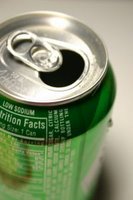It’s baaaack!
 An earmark of junk science is that it never dies and continually resurfaces, no matter how thoroughly it has been debunked.
An earmark of junk science is that it never dies and continually resurfaces, no matter how thoroughly it has been debunked.“Health Tips” plastered across publications from Forbes to the Washington Post today quote the Nemours Foundation’s claims that “ a single 12-ounce soft drink with sugar per day raises a child’s risk of obesity by 60 percent.”
If this sensational claim sounds simply illogical, you would be right. The source of this oft-repeated scare is an observational study done in 2001 that has since been resoundly discredited. It was, however, the only study cited by the American Academy of Pediatrics to support their 2004 “Policy Statement Soft Drinks in Schools Committee on School Health” calling for eliminating sodas in schools.
The study published in Lancet, led by David Ludwig of Boston Children’s Hospital, was based on questionnaires asking 548 children, 11-years old, to remember what they’d eaten. The researchers then looked for correlations between sugar drinks and body weights. The children had consumed an additional 158 calories per day over the course of the 18-month study — not surprising considering children that age are growing rapidly. Even so, sweetened drinks accounted for only a small percentage of those new calories and the total incidence of obesity was statistically unchanged during the study.
Their findings also showed no difference in the BMIs of children consuming the most and the least amounts of sugar or sugary drinks. In the discussion section of the study, the researchers even noted “there is no clear evidence that consumption of sugar per se affects food intake in a unique manner or causes obesity.”
That is considerably at odds with their conclusion that “consumption of sugar-sweetened drinks could lead to obesity.” Once again, it’s imperative to look at a study’s actual findings and not simply scan the conclusions or an abstract!
The popular claim that sodas contribute to obesity were based on 37 more children in this study who met the researcher’s definition of “obese” at the end of the study, but who hadn’t at the beginning. But this ignored the 35 children who had been labeled “obese” at the beginning of the study but who weren’t at the end — demonstrating the variable nature of “obesity” determinations in growing children.
Soda had nothing to do with that.




<< Home